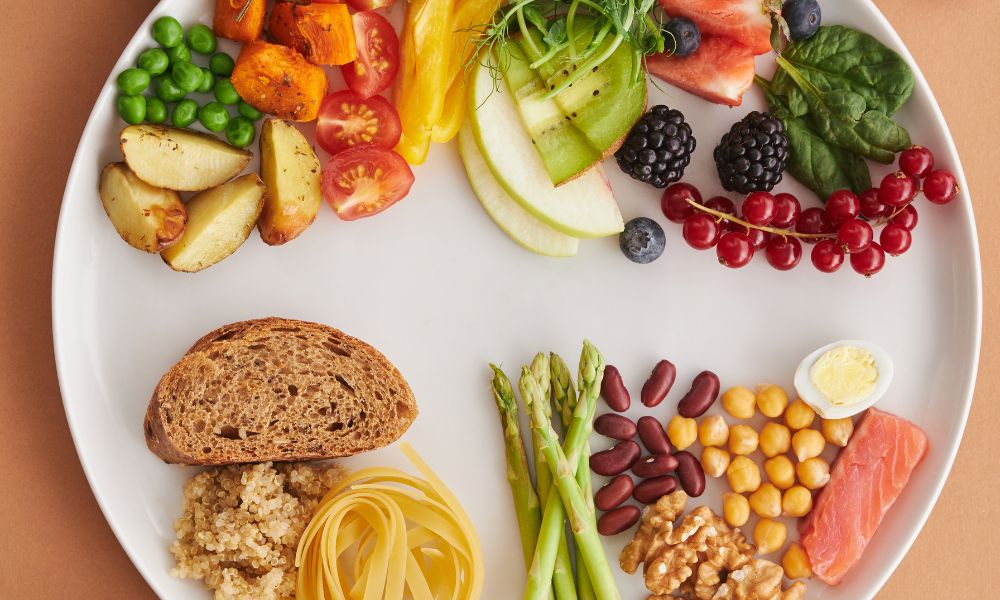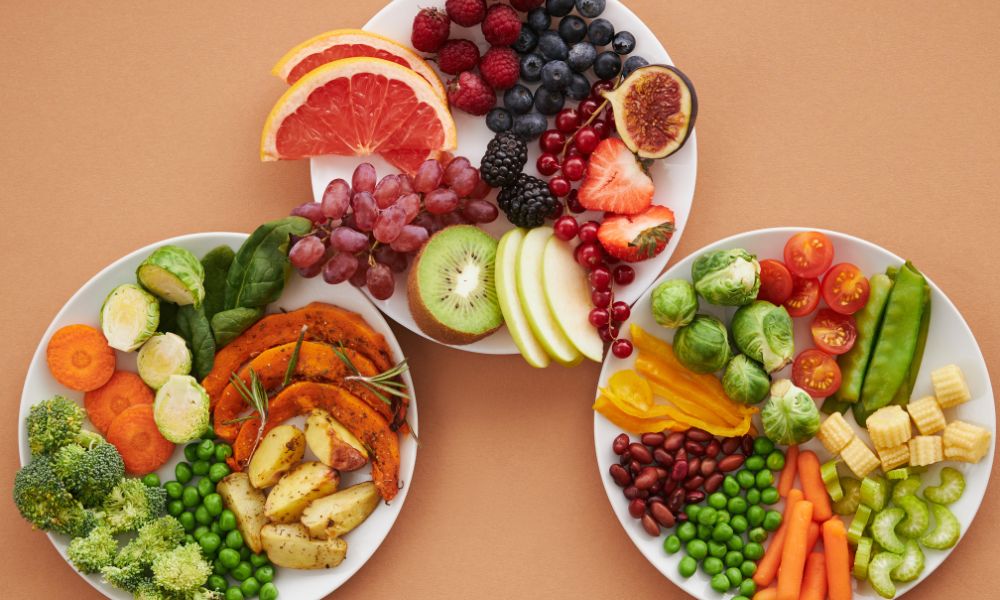Are you curious about vegetarianism and what it entails? Perhaps you’ve heard the term “vegetarian” thrown around but aren’t quite sure what it means. Fear not! In this blog post, we will delve into the world of vegetarianism and provide a comprehensive guide to everything you need to know about giving up meat and embracing a plant-based lifestyle. From the different types of vegetarian diets to the nutritional considerations involved, we’ll cover all the bases so that by the end of this article, you’ll have a thorough understanding of what it means to be a vegetarian. So grab yourself a cup of tea (or carrot juice!) and let’s get started!
What is a vegetarian?

A vegetarian is someone who does not consume meat, poultry, or fish. This means that their diet mainly consists of plant-based foods such as fruits, vegetables, grains, and legumes. There are different types of vegetarians depending on what they choose to include or exclude in their diet.
Lacto-ovo vegetarians do not eat flesh but still consume dairy products and eggs. Vegans, on the other hand, eliminate all animal-derived products from their diet including milk and eggs. Some people follow a pescatarian diet which includes fish but avoids any other type of meat.
The reasons for becoming a vegetarian vary from person to person. For some, it may be ethical or environmental concerns while for others it could be health-related reasons.
It’s important to note that being a vegetarian doesn’t necessarily mean that you have a healthier diet compared to someone who eats meat. It’s possible for a vegetarian to have an unhealthy diet if it lacks variety and essential nutrients such as protein, iron, and Vitamin B12.
Being a vegetarian is about making conscious choices about what you eat and how it impacts your body and the world around you.
Types of Vegetarian Diets

- There are several types of vegetarian diets, each with its own set of guidelines and restrictions. The most common include:
- Lacto-ovo vegetarian: This diet includes both dairy products and eggs, but excludes meat, poultry, fish, and seafood.
- Lacto-vegetarian: Similar to the above diet but excludes eggs in addition to meat, poultry, fish, and seafood.
- Ovo-vegetarian: Includes eggs but no dairy products or other animal-based foods.
- Vegan: A strict plant-based diet that excludes all animal products including meat, dairy products, and eggs.
- Flexitarian: Also known as semi-vegetarianism; this is a flexible approach where people sometimes eat meat or fish in moderation while primarily eating a plant-based diet.
- It’s important to note that regardless of which type of vegetarianism you choose to follow, it’s essential to make sure your meals are balanced with enough protein sources such as beans, nuts/seeds, or tofu/tempeh plus vitamins like B12 found only in animal-derived food sources if following veganism long term.
Nutritional Considerations when Following a Vegetarian Diet

When it comes to following a vegetarian diet, there are some important nutritional considerations that must be taken into account. One of the primary concerns is ensuring that you’re getting enough protein. While many people assume that meat and animal products are the only sources of protein, there are actually plenty of plant-based sources as well.
Beans, lentils, tofu, nuts, and seeds are all excellent sources of protein for vegetarians. It’s important to eat a variety of these foods throughout the day in order to ensure you’re meeting your daily needs.
Another consideration is iron intake. Iron is an essential mineral that helps transport oxygen throughout the body and plays a crucial role in overall health. Vegetarian sources of iron include leafy greens like spinach and kale, beans and legumes, dried fruit like apricots or raisins, and fortified cereals or bread.
Calcium is also an important nutrient for strong bones and teeth. Dairy products are often considered one of the best sources but vegetarians can get calcium from other options such as dark leafy greens (kale), soy milk, or tofu made with calcium sulfate.
Finally, we have Vitamin B12 which plays a vital role in nerve function among other things. Most reliable food sources come from animal-derived products so vegetarians should supplement through fortified foods like plant milk or breakfast cereals which will provide sufficient amounts without having deficiencies over time.
It’s crucial to pay attention to your nutrient intake when following any type of diet!
The benefits of being a vegetarian

The benefits of being a vegetarian go beyond personal convictions and environmental impact. Vegetarianism has been linked to improved health outcomes, such as reduced risk for chronic diseases like heart disease and cancer.
Research shows that vegetarians tend to have lower blood pressure, cholesterol levels, and body mass index (BMI) compared to non-vegetarians. This is due in part to the high intake of fiber-rich foods like fruits, vegetables, legumes, and whole grains.
Vegetarian diets are also rich in essential vitamins and minerals like vitamin C, folate, iron, and potassium which support overall health. Plant-based proteins found in beans, nuts or tofu help maintain muscle mass without contributing unhealthy fats or cholesterol.
In addition to physical benefits, there are also mental health benefits associated with a plant-based diet including reduced stress levels thanks to the relaxing effects of certain nutrients on the brain.
There’s no doubt about it – going vegetarian can lead you down a path toward better health!
The drawbacks of being a vegetarian

While there are several benefits to following a vegetarian diet, there are also some potential drawbacks that one should be aware of. Here are a few:
Firstly, it can be challenging to get enough protein on a vegetarian diet. Although plant-based sources of protein do exist, such as beans and lentils, they may not provide all the essential amino acids in sufficient quantities.
Secondly, some vegetarians may struggle with getting enough vitamin B12 which is mainly found in animal products. Therefore supplementation or fortified foods might need to be consumed.
Thirdly, dining out can also pose challenges for vegetarians as many restaurants do not offer meat-free options or have limited choices available. This could mean missing out on social events altogether or having to settle for less satisfying meals.
Maintaining a balanced and varied vegetarian diet requires careful planning and preparation since certain nutrients like iron and zinc tend to be low in plant-based diets due to lower Bioavailability (the proportion of food that’s actually absorbed by your body).
While being a vegetarian has its perks; individuals considering this lifestyle change must weigh the advantages against these possible concerns before making their final decision.
How to Become a Vegetarian

- Transitioning to a vegetarian diet can be challenging, but it’s definitely worth the effort. Here are some tips on how to become a vegetarian:
- Educate yourself: Before making any dietary changes, do your research. Read up on different types of vegetarian diets and find out what nutrients you may need to supplement.
- Take it slow: Going cold turkey (no pun intended) might not work for everyone. Consider gradually cutting down on meat and incorporating more plant-based meals into your diet.
- Plan ahead: Meal planning is key when transitioning to a new way of eating. Make sure you have plenty of healthy snacks and meal options available at all times.
- Experiment with new recipes: Trying out new vegetarian recipes will help keep things interesting and prevent boredom with your food choices.
- Don’t beat yourself up: Slip-ups happen! If you accidentally eat something non-vegetarian, don’t stress about it too much. Just get back on track and keep moving forward.
- By following these tips, becoming a successful vegetarian can be achievable for anyone who wants to make the switch!
Conclusion
A vegetarian informative speech aims to educate people about the benefits and drawbacks of following a vegetarian diet. As discussed earlier, there are different types of vegetarian diets that one can follow depending on their personal preferences and beliefs.
While following a vegetarian diet offers numerous health benefits such as reducing the risk of chronic diseases like heart disease, diabetes, and cancer, it is essential to plan your meals carefully to ensure you get all the necessary nutrients.
Becoming a vegetarian requires commitment and discipline, but it is achievable with proper planning. Whether you choose to become a lacto-ovo-vegetarian or vegan, making this lifestyle change is ultimately rewarding for both your health and the environment.
Being aware of what we consume plays an important role in our overall well-being. Educating ourselves about different dietary options such as becoming a vegetarian has its advantages over other diets that include animal products. So if you’re considering taking this step towards healthier living – give it a try!

